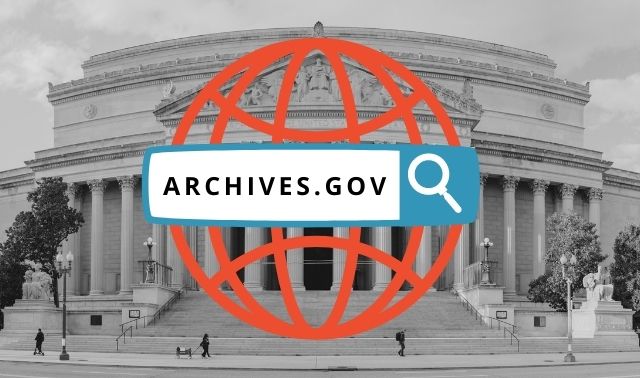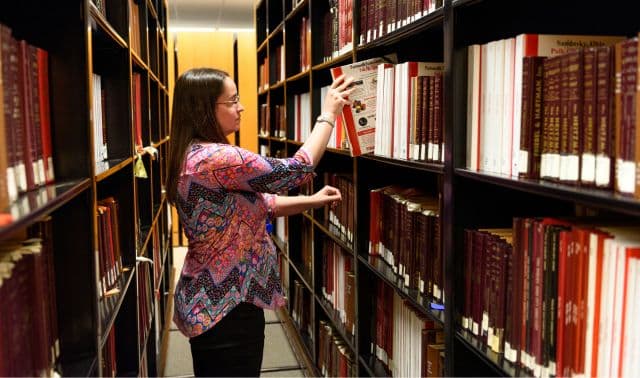Sign up for the Family Tree Newsletter! Plus, you’ll receive our 10 Essential Genealogy Research Forms PDF as a special thank you.
Get Your Free Genealogy Forms
"*" indicates required fields
What Genealogy Resources Can I Expect to Find at a Library?
Most Famous Genealogy Libraries
General Library Genealogy Research Tips
The endless rows of books, the friendly librarians, the comforting hush occasionally interrupted by turning pages—avid readers and devout researchers alike can’t help loving the atmosphere of a well-stocked library. This can be especially true for genealogists, both those just starting to grow their family trees and those who have been at it for a while.
Of course, just arriving at your local library and expecting to find earth-shattering answers to family mysteries that have endured for generations isn’t realistic. You will want to be armed with the right tools and strategies to make the most of your library trips. In this guide, we provide some practical tips for genealogy library research and offer some handy resources to guide you wherever you may be searching.
Important Library Terms
Before heading to the closest library, you might want to familiarize yourself with some common terms. These terms will likely appear often as you search for records; the better you understand what they mean, the more you can get out of the resources you find.
Archive: A collection of documents and records that provides information on places, people or other notable subject matter. Typically, archives contain objective information related to a specific point in time and are usually collected and preserved by agencies or institutions
Card Catalog: A listing that contains pertinent information about a resource, such as its author, title and present location
Index: A list of objects or names that directs you where to find specific information
Periodical: Any publication that is published on a set schedule (for example, a newspaper or magazine)
Repository: Any place where records are stored, usually with the goal of keeping them safe in the long term
What Genealogical Resources Can I Expect to Find at Libraries?
Books
When most people think of libraries, they think of bookshelves as far as the eye can see. You can certainly find excellent genealogy-related books at libraries, especially those that specialize in genealogy. For example, the renowned FamilySearch Library in Salt Lake City, Utah boasts over 340,000 books. You can even access many of them digitally. If you are not sure where to begin with genealogy books, you can peruse a list of some of our readers’ favorites.
Periodicals
Publications like newspapers, magazines and newsletters can offer a glimpse into the world in which your ancestors lived. Getting your hands on a newspaper from, say, 1905 may seem like a challenge. Fortunately, many libraries can help you access archives where such materials can be found via simple searches. You can also search PERSI (Periodical Search Index) via the Allen County Public Library website for articles spanning centuries, right from the comfort of your own computer. If you are new to parsing newspapers for valuable genealogical newspapers, you might find our guide to newspaper research helpful.
Indexes
Indexes of historical records are often a treasure trove of genealogical information. While reading through long indexes may seem intimidating, these resources can help you pin down birth and death certificates, census records and so much more. Libraries can give you access both to books and digital materials containing such indexes. If you are new to using indexes to locate records, this guide might help.
Photos
Sometimes it helps to put a face to person or to see what that local high school or church looked like “back in the day.” Many libraries have photo collections for you to browse. Such collections might include yearbooks, photos of local businesses and landmarks and so much more.
Most Famous Genealogy Libraries
Generally speaking, most libraries can provide you with priceless resources to help you find your ancestors. That said, several libraries are well-known for offering access to exclusive tools, archives and other resources that hold information you might otherwise overlook. We have compiled a list of such libraries. Below we also highlight some of the most famous genealogy libraries open today, what makes them stand out and how you can access some of their resources even if you can’t physically travel to them.
The FamilySearch Library
Operated by the Church of Jesus Christ of Latter-day Saints and often hailed as the world’s largest genealogy library, the FamilySearch Library in Salt Lake, City Utah has it all—not just a healthy offering of books, but also over 128,000 periodicals, almost 1.4 million films and more. The FamilySearch Library also boasts an extensive digital library that you can search from anywhere. If you are not sure where to begin, you can always review our guide to help you navigate it with ease. If you ever get to make the trip for yourself (if you have not yet!), it might help to know what to expect.
The Library of Congress
There’s plenty to do in Washington D.C., including genealogy research at the remarkable Library of Congress. Here you will find thousands of materials to aid your research, such as maps, newspapers and collections on specific cities and towns. The best part? You can access much of this information without ever stepping foot in Washington, especially with a handy guide at your side as you research.
Your Local Library
You may be surprised by what family mysteries you can uncover just by searching in your own backyard—or in this case, your local library. Your local library can be especially valuable if a large portion of your family hails from the area. You may be able to spot ancestors in yearbooks or pin down when a specific event happened in local newspaper archives.
Other Digital Resources
Thanks to the World Wide Web, you don’t even need to plan a day at an actual library. All you really need is a reliable internet connection, an electronic device and some time to spare on research. Best of all, many of these resources are free. Some other digital resources include:
Newspaper Archives
Newspapers are the perfect place to start your genealogy research. Not only can old newspaper articles perfectly illustrate decades past, they can also provide key details that may be difficult to find simply by perusing the more standard records like birth certificates or census records. They can provide context for how and when your ancestors lived. Best of all, there are many newspaper archives online worth searching.
Archives.gov
The U.S. National Archives (NARA) contains billions of records, many of which are relevant to genealogists. In fact, the website offers an entire page dedicated to useful links and resources for genealogists. Learning how to navigate such a vast sea of records may take time, but you may be surprised by what you find.
WorldCat
Can’t find a specific book or article at your library? Do not surrender to the brick wall just yet. WorldCat may be able to connect you to libraries with those elusive resources. WorldCat is one of the world’s most expansive library networks. If you find an item at a library other than your own, you may be able to request it via the interlibrary loan system. In any case, our guide can help you craft effective queries to better ensure that you find the resources you seek.
General Library Genealogy Research Tips
Now that you better understand where to go and what to search for, you might be wondering how to actually go about conducting genealogy research via a library. There are many tips and tricks to keep in mind. Below are some notable ones:
- Don’t Be Shy; Ask a Librarian! Forget that childhood stereotype of the curmudgeonly, stern librarian always ready to shush you. In reality, librarians want to help you find what you are looking for. Whether you are visiting the library in person or simply sending an email via the library’s website, be ready to provide the librarian with as much information as you can: what you are researching, what you have found so far, the present gaps in your research and anything else that you think may be relevant. The librarian can then point you toward resources or tools you might not have yet even considered checking.
- Don’t Limit Yourself to Common Genealogy Records: Instinctively, many genealogy-minded people focus on finding the more “obvious” answers in their obvious places: birth certificates, death notices, census records and so on. But you might be surprised what you find by straying from these “comfort zones” and daring into other territory (think land records, business directories, etc.)
- Take Photocopies of What You Can’t Physically Take: If you visit a library in person, you may find that you cannot take some items home with you. Do not despair! There are ways around this. Just because you cannot stow away the book into your bag does not mean that you cannot leave the building with the information at all. Take photocopies of the pages that interest you and then store them away someplace safe, like a special research folder or binder.
- Remember That There’s No Deadline for Good Research: Can’t find the information you need the first time you search for it? Or the second? Or even the third or fourth? Don’t give up altogether. Perhaps you need to refine your search terms. Or maybe you need to rethink where you are looking for materials. In any case, remember that good, thorough research takes time. You just never know when the right book or article or record will find its way to your hands or computer screen!







